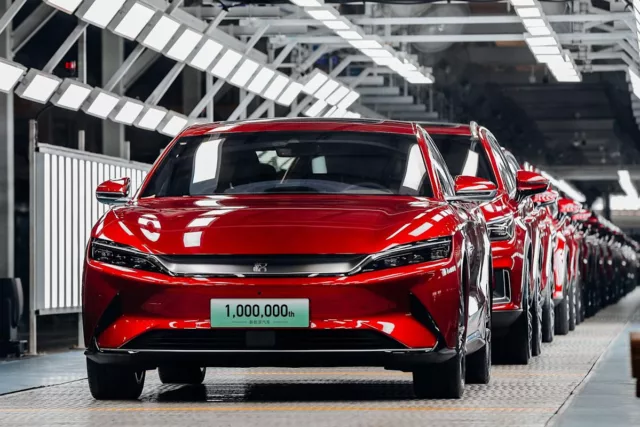
BYD has increased its global sales tenfold in five years
BYD is not considering setting up a factory in the UK despite needing extra capacity to support its rapid expansion plans.
The company, which has increased its global sales tenfold in just five years to become the world’s sixth-largest car maker, is increasing its global footprint with its first European factories, in Hungary and Turkey. This move reflects its desire to become as localised as possible in the markets where it operates.
Yet despite the UK being a «very high priority» for the sales success and expansion of BYD in volume terms, the firm’s executive vice president, Stella Li, told Autocar that a UK plant is not under consideration.
Advertisement
Advertisement
«We’ll see what happens,» she said, before effectively ruling out a plant even in the long term, unless market conditions change, by adding the UK is “not a friendly manufacturing facility” in terms of the size of its existing manufacturing base, and it «doesn’t have enough labour resource».
Li confirmed that BYD has not had a discussion with the UK government about any potential infrastructure investment in the UK and nor had the government made any approach in return.
However, she said this is to be expected because BYD is still at «the very early stage» of development in the UK and it needs to build the brand and its own network first.
Li also said there are «no plans» for the brand to launch a factory in Germany, despite a report this week suggesting one is under consideration.
Advertisement
Advertisement
BYD will later this year open a factory in Hungary that will ultimately build around four to six models for sale in Europe.
«BYD is going from being an international company to a local company and we want to be a European producer,» said Li.
Li admitted surprise at how long it takes to get a factory online in Europe versus in China, where it can go from a greenfield site to operational in 11 months. «Hungary has so far taken two and a half years,» she said. «It adds a lot of cost and complexity.»
She added that it is also harder to hire labour resources in Europe, «whereas in China you can hire 10,000 people quite easily».
Advertisement
Advertisement
A second factory in Turkey will open next year and progress here is faster, Li said, with the expected completion time to be around 16 months.
European factories will help BYD navigate tariffs that its electric models imported into Europe from China are currently subject to.
Li said tariffs are a «short-term» play and that «BYD is a long-term player».
She added: «We made an investment in Hungary three years ago, long before tariffs. To be successful in the market, you need to be here.»
More broadly on what sets BYD apart from other Chinese brands exporting to Europe, she said: «If you come to Europe, you need a long-term strategy, to invest and to pay attention to aftersales and the dealer network.»
Advertisement
Advertisement
Li welcomed the UK’s ZEV mandate, which means car makers have to sell a preset and increasing proportion of electric cars each year, something BYD as an EV-dominant brand has no trouble achieving.
She said the mandate provides a «stable» market framework and clarified the direction of travel for car makers «as you have no other choice as an OEM» than to invest in EVs. «China has been successful for that reason,» she said. In comparison, the European Union’s constant legislative changes, including a recent switch to CO2-based legislation over a number of years, are «confusing».
Li does not believe in incentives for electric cars either and they would either stifle demand as people would wait for their introduction before buying or cause demand to collapse if they were taken away. Instead, her favoured approach is to «let the industry compete» on making more affordable models.
]]>








